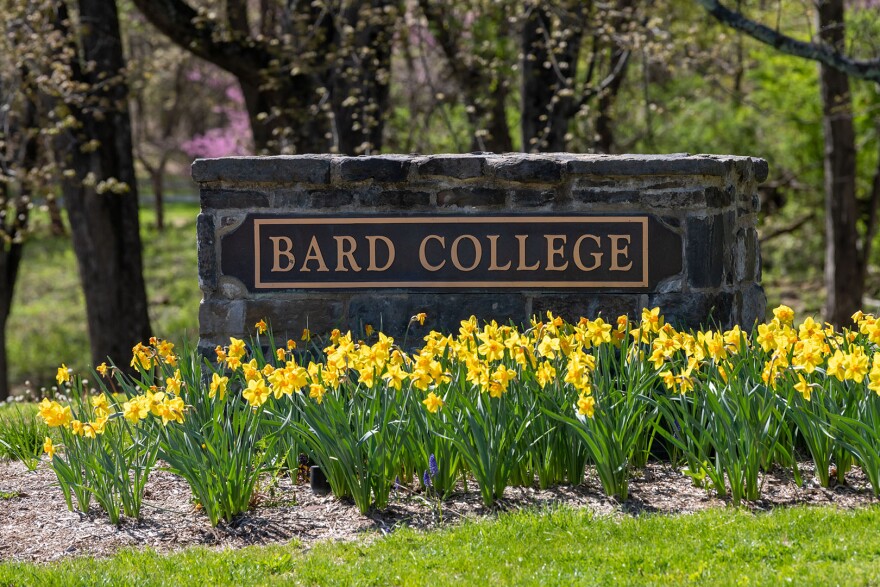The process marks the first time the private college’s environmental services specialists and its building and grounds workers have come together to negotiate two separate, three-year contracts. Both groups are represented by SEIU Local200United.
Robert Dickson is the chair of the union’s building and grounds chapter, as well as a carpenter on the campus in Annandale-on-Hudson.
"Primarily what we’re hoping for is to maintain our healthcare benefits without any significant cost added on top of that," he explains. "We would also like a form of wage increase that would address the cost of living index and the inflation that we’ve all seen across the Hudson Valley, here. We would like these things to, in some way, compensate for the drastic rises in housing prices, rents, foodstuffs, and gasoline that everybody is experiencing."
Currently, Bard pays its building and grounds workers, including carpenters, electrical workers, snow removal teams, and more, a starting wage of $32 an hour. Environmental services specialists, made up of custodian and maintenance workers, make considerably less, starting at $15.50 an hour. Dickson says the union is demanding that the college bump that starting wage up to $19.50 an hour – and furthermore, the building and grounds workers agreed to pause a previously-agreed-upon 3 percent wage increase during the pandemic, and they’d like to get that back.
"Many of the people in that bargaining unit, and especially in the environmental services department, have another job," he adds. "And not just for five days a week. Many of these people work six days a week."
Coleen Alexander, vice president for administration at Bard, says the college has drawn up a plan that would start environmental services specialists at $18.50 an hour. She says that would automatically bring the average wage for current workers in that group to the $22 mark, and those who have worked in environmental services for over 20 years would automatically be making more than $25 an hour. Under Bard’s proposal, building and grounds workers would also receive a 2.5-3 percent wage increase over the course of three years.
"We looked at about 12 different schools within a 100-mile radius, including all of the SUNY schools," says Alexander. "This is very much on par with other colleges, or more."
On Wednesday, though, workers pushed back against that plan, with healthcare being the sticking point. Under Bard’s proposal, Alexander says both groups would be asked to contribute more to their health insurance: environmental services workers would be asked to contribute roughly $30 a month for individual coverage plans, and $180 a month for family plans. Building and grounds workers would pay even more, at $50 a month for single plans and up to $200 a month for family plans.
"It’s a modest increase, and it won't start until year two of the contract," she maintains.
Dickson says workers with single plans haven’t typically had to contribute to their healthcare coverage, and any increase is just not a viable option.
"A lot of our people are also at the age now where they're looking after other family members," notes Dickson. "The healthcare for this is critical."
So, for now, the talks continue. Dickson says they are still in a negotiation stage as they near the October 23 deadline, but when it comes to the possibility of a strike, “all options are open.”
This all comes as Bard College works to grow the size of its campus: the school is reportedly in the process of buying the 260-acre site of the former Unification Theological Seminary in Barrytown for $14 million. Alexander says it’s too soon to determine just what that expansion will entail, how many additional staff they’ll have to hire, or how it might impact workers – the sale hasn’t even closed yet – but Dickson says he worries about the school’s expansion overwhelming employees.
"We have not had any significant additions to our workforce in the last 20 years," says Dickson. "We've had some here and there, but the carpentry trade, for example: we had five carpenters 20 years ago, and five carpenters up to yesterday."
In a letter to the campus community earlier this week, Alexander and other Bard officials emphasized the school’s commitment to the collective bargaining process, adding “We are more aligned in values and interests than divided by differences.”
Alexander says the college is working hard in good faith.
"Bard is not in any way anti-union. We treat our employees well, and we treat our union members well," says Alexander. "We’ll get a contract, and we will get back to work and move forward."



